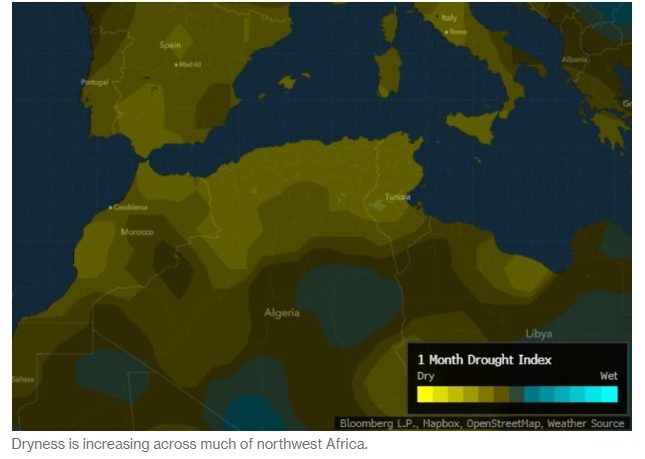Bloomberg
By Souhail Karam and Megan Durisin
- Heat, dryness threatens crops in Morocco, Algeria and Tunisia
- Smaller output would boost dependence on grain imports
It’s deja vu for Morocco’s grain farmers, who are bracing for another dismal harvest as one of the worst droughts in decades withers crops.
“Morocco is Thirsty,” the daily L’Economiste said on its front page last week after several months of dryness and heat hurt wheat and barley plants. It’s an apt headline too for nearby Algeria and Tunisia, which are also running out of time for conditions to improve before harvesting starts in the coming months.
While it’s too early to predict how badly harvests will be affected, output will likely drop from a year earlier without showers soon. That could make the region, a key buyer of European and Black Sea grain, more reliant on imports.
“The water shortage problem is big,” said Youssef Alaoui, secretary general of Morocco’s agriculture lobby group Comader. “There is little doubt that the wheat harvest this year will be lower, with a big question mark over its quality compared to last year.”
Crop quality has deteriorated so much that some Moroccan farmers have given in to letting livestock graze on wheat and barley plants after pastures dried out. Authorities rationed water supply to golf courses and swimming pools in the nation’s Souss region, a key area for fruit exports, L’Economiste said.
Most wheat fields in northwest Africa had just 25% or less of normal rain in the past three months, one of the driest stretches since at least 1980, Commodity Weather Group said. It’s also been the hottest ever for the time of year. Dryness is expected to last through mid-March across the region.
That’s making crops develop too quickly, curbing yields. There’s still a few weeks for rains to improve crops in Algeria and Tunisia, but there’s a smaller window for Morocco, where conditions are worst, said Monika Tothova, an economist at the United Nations’ Food & Agriculture Organization.
“Barring a miracle in the next few weeks, drought looks set to compromise crops this year,” said Abdelouahed El Jai, an economist at Rabat-based think tank Cerab.
Economic Hit
Smaller grains output could be a blow to Morocco’s plans to revive an economy hurt in recent years by poor harvests and weak demand from its key European export market. Agriculture employs roughly 35% of the country’s workforce and contributes about 12% to its economy.
Still, the possibility of more imports would be good news for countries like France and Ukraine, who count North African nations as key customers. Morocco’s wheat imports are already expected to jump 29% to 4.8 million tons this season, the second-highest on record, after drought cut the previous crop.

Wheat imports are bound to rise next season as well, said Rachid Aourraz, an economist at the Moroccan Institute for Policy Analysis. Comader’s Alaoui said Morocco could hold more tenders to buy barley, while a Tunisian agriculture union also expects rising grain purchases. The situation is worrying for grains in Algeria too, said Mohamed Alioui, head of the nation’s farmers union.
“I hope that the rain will return by March 15,” Alioui said. “After that date, we will have serious concerns.”
— With assistance by Salah Slimani, and Jihen Laghmar







